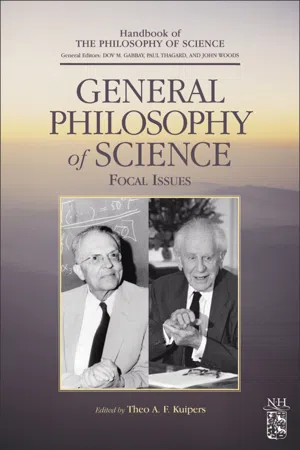
- 708 pages
- English
- PDF
- Available on iOS & Android
General Philosophy of Science: Focal Issues
About this book
Scientists use concepts and principles that are partly specific for their subject matter, but they also share part of them with colleagues working in different fields. Compare the biological notion of a 'natural kind' with the general notion of 'confirmation' of a hypothesis by certain evidence. Or compare the physical principle of the 'conservation of energy' and the general principle of 'the unity of science'. Scientists agree that all such notions and principles aren't as crystal clear as one might wish.An important task of the philosophy of the special sciences, such as philosophy of physics, of biology and of economics, to mention only a few of the many flourishing examples, is the clarification of such subject specific concepts and principles. Similarly, an important task of 'general' philosophy of science is the clarification of concepts like 'confirmation' and principles like 'the unity of science'. It is evident that clarfication of concepts and principles only makes sense if one tries to do justice, as much as possible, to the actual use of these notions by scientists, without however following this use slavishly. That is, occasionally a philosopher may have good reasons for suggesting to scientists that they should deviate from a standard use. Frequently, this amounts to a plea for differentiation in order to stop debates at cross-purposes due to the conflation of different meanings.While the special volumes of the series of Handbooks of the Philosophy of Science address topics relative to a specific discipline, this general volume deals with focal issues of a general nature.After an editorial introduction about the dominant method of clarifying concepts and principles in philosophy of science, called explication, the first five chapters deal with the following subjects. Laws, theories, and research programs as units of empirical knowledge (Theo Kuipers), various past and contemporary perspectives on explanation (Stathis Psillos), the evaluation of theories in terms of their virtues (Ilkka Niiniluto), and the role of experiments in the natural sciences, notably physics and biology (Allan Franklin), and their role in the social sciences, notably economics (Wenceslao Gonzalez).In the subsequent three chapters there is even more attention to various positions and methods that philosophers of science and scientists may favor: ontological, epistemological, and methodological positions (James Ladyman), reduction, integration, and the unity of science as aims in the sciences and the humanities (William Bechtel and Andrew Hamilton), and logical, historical and computational approaches to the philosophy of science (Atocha Aliseda and Donald Gillies).The volume concludes with the much debated question of demarcating science from nonscience (Martin Mahner) and the rich European-American history of the philosophy of science in the 20th century (Friedrich Stadler).- Comprehensive coverage of the philosophy of science written by leading philosophers in this field- Clear style of writing for an interdisciplinary audience- No specific pre-knowledge required
Frequently asked questions
- Essential is ideal for learners and professionals who enjoy exploring a wide range of subjects. Access the Essential Library with 800,000+ trusted titles and best-sellers across business, personal growth, and the humanities. Includes unlimited reading time and Standard Read Aloud voice.
- Complete: Perfect for advanced learners and researchers needing full, unrestricted access. Unlock 1.4M+ books across hundreds of subjects, including academic and specialized titles. The Complete Plan also includes advanced features like Premium Read Aloud and Research Assistant.
Please note we cannot support devices running on iOS 13 and Android 7 or earlier. Learn more about using the app.
Information
Table of contents
- Front Cover
- General Philosophy of Science: Focal Issues
- Copyright Page
- Table of Contents
- General Preface
- Introduction: Explication in Philosophy of Science
- List of Contributors
- Chapter 1 Laws, Theories and Research Programmes
- Chapter 2 Past and Contemporary Perspectives on Explanation
- Chapter 3 Evaluation of Theories
- Chapter 4 The Role of Experiments in the Natural Sciences: Examples from Physics and Biology
- Chapter 5 The Role of Experiments in the Social Sciences: The case of Economics
- Chapter 6 Ontological, Epistemological, and Methodological Positions
- Chapter 7 Reduction, Integration, and the Unity of Science: Natural, Behavioral, and Social Sciences and the Humanities
- Chapter 8 Logical, Historical and Computational Approaches
- Chapter 9 Demarcating Science from Nonscience
- Chapter 10 History of the Philosophy of Science. From Wissenschaftslogik (Logic of Science) to Philosophy of Science: Europe and America, 1930–1960
- Index